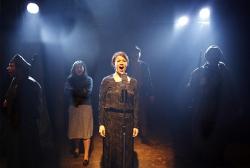Goodbye Barcelona (Fringe)
Sometimes, the best of intentions do not result in the best of work. 'Goodbye Barcelona' is just such a case, for there is no doubting the sincerity behind this new musical which is obviously motivated by a deep admiration for thousands of volunteers who gave up their ordinary lives to head overseas to fight for others.
The subject of 'Goodbye Barcelona' is the Spanish Civil War which took place between 1936 and 1939 and acted almost as a curtain-raiser to the horrors of the Second World War. The German and Italian governments were sponsoring Franco's fascists, while the republicans were given assistance by the Russians and Mexicans, with the former being paid for their assistance in gold. Other countries such as the British and French stayed resolutely out of the conflict, leaving the republicans to seek assistance from volunteers. These became the 'International Brigades' which numbered over 40,000 and came from more than 50 countries.
'Goodbye Barcelona' focuses on the lives of two main characters. When we meet Sammy and his mum, Rebecca, they are already fighting the fascists on the streets of London. But Sammy's socialist idealism drives him to volunteer for the International Brigades and he promptly heads off to Spain. Once there, he meets up with other volunteers such as the cynical Jack who is not fighting 'for' something but 'against' it. And Sammy discovers the myriad, squabbling political factions and the lack of equipment to fight a modern war. Meanwhile, back in London, Rebecca is missing Sammy, and decides to follow him to Spain where she becomes a nurse and spends her time patching up the republican soldiers so they can return to the lines.
The Arcloa is perhaps the best location for a show with this theme. With it's stripped-back walls and industrial features, you could almost be back in the 1930s, and in a war-torn building to boot. But the show itself fails to capitalise on that in spite of a spirited and committed cast. Part of the problem is that the songs do not emerge naturally from the dialogue and situations, contriving an impediment to the progress of the piece, rather than moving it on and developing the emotional atmosphere. The dialogue too is flawed, lacking the gritty reality of war and the associated unbearable conditions. Emerging from tortuous campaigning, Sammy tells his sweetheart, Pilar, that it was 'really tough', which sounds more like a student coming out of an A level exam, rather than a young man returning from the nightmare reality of war. And the staging fails to add to the atmosphere - when the big numbers occur, the cast are lined-up around the stage area like statues in an exhibition.
The second half of the show is certainly better. War weary and now more hardened, the fighters communicate more depth of emotion even though it still never felt totally realistic or convincing. In fact, the lack of realism is perhaps the most significant factor which is missing here. I never felt at any point that I was in Spain in the 1930s, nor in hot and unbearable conditions, that I was trapped in the midst of a savage and brutal war where atrocities were committed on a grandly inhuman scale. It never took me to the place where the International Brigades fought and died, and that is a pity, because the authors obviously made, quite rightly, a very strong connection with the courageous volunteers of the Brigades. Sadly, that connection and admiration is not reflected in the show in spite of the best of intentions.
(Peter Brown)
Originally published on
